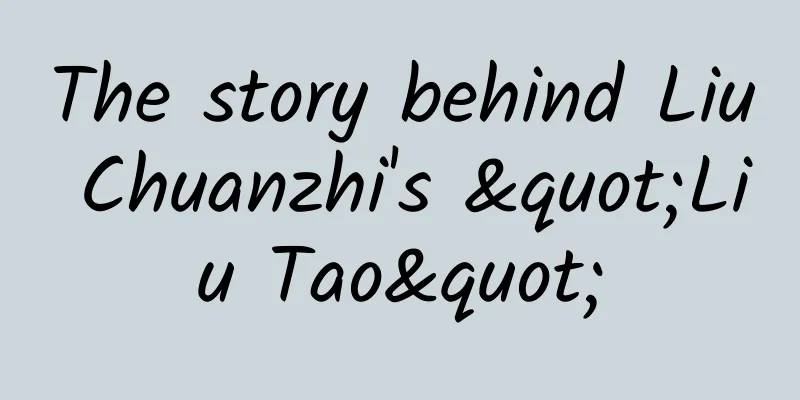The story behind Liu Chuanzhi's "Liu Tao"

|
On October 8, Mr. Liu from Lenovo Holdings posted a call for advice on the Internet, seeking advice from Internet elites and exploring the marketing methods of Liutao e-commerce. So far, Tongdao and Diaoye have already given their own proposals. It is expected that in the next few days, we will also be able to see the proposals of Bai Ya, Wang Ke and Wang Xing, who are said to be among the five young heroes who were nominated. I think there will be more interesting communication ideas. However, preliminary judgment shows that the most rewarded proposal among all these proposals is the "recruitment of heroes" proposal. It has attracted much attention in the IT circle in recent days, but the premise is that it is regarded as a PR activity in the industry. Because if "Liu Tao" is regarded as a business, as Mr. Liu's expectation for the revitalization of China's agriculture, then whether it is the creativity of this heroic post or the naming of the five young heroes, I think it is too far from reality. As a fresh product, "Liu Tao" is neither a standard product nor a high-profit product, nor a product that can be undertaken by ordinary logistics. Therefore, asking those who make essential oils, those who do catering group purchases, those who work in the low-end consumer market, and designers, I feel like I am asking the blind (I have absolute respect for the five young heroes, but I am just talking about the facts). But because I have been working in the fresh food e-commerce industry for the past two years and have achieved some relatively recognized project results, many people have consulted me recently about this matter, and all kinds of bizarre ideas and preconceived notions have bothered me. So, I simply took Liutao as an example and started a post to talk about the simple chain of a fresh food brand from creation to sales. I dare not say that I can only share, and I hope that there will be more and more brands like Liutao in China. 1: The story behind Liu Tao Liutao is actually a high-end subsidiary brand of Lenovo Joyvio’s own kiwifruit brand “Jinyan” grown in Chengdu. It is labeled with the word “Liu”, which means that Liutao is actually Jinyan kiwifruit, but Jinyan kiwifruit is not necessarily Liutao. Lenovo Joyvio has a series of screening and inspection standards. Its direct competitor is imported kiwifruit, or more directly, New Zealand Zespri kiwifruit, which is in an absolutely strong position in China’s kiwifruit market, especially the golden fruit market. Even many Chinese people think that kiwifruit is a fruit from New Zealand. But they don't know that kiwi is actually another name for kiwifruit. In 1904, thirty years before the reign of Emperor Guangxu of the Qing Dynasty, kiwifruit was a unique native fruit in China. With the footsteps of missionaries (I have always believed that these guys are more hateful than those with guns and cannons), it was introduced to New Zealand. After 110 years, in New Zealand, kiwifruit has thousands of varieties after years of scientific optimization and breeding, accounting for 31% of the country's total agricultural exports each year. More than 80,000 tons of kiwifruit are exported to China every day, and are regarded as a national treasure by New Zealand. As the origin of kiwifruit, the planting area of high-quality varieties in China has been shrinking year by year. The genes of kiwifruit have almost deteriorated across the board, and no one cares about its future. All of this has caused Chinese kiwifruit to fail miserably in the local market and become a low-end commodity. Here, it is not only the technology that is backward, it is not only the concept that is backward, but also the negative attitude after the game between economic interests and moral conscience! I think it is precisely because of this that Lenovo Joyvio chose kiwifruit as the entry point, carrying Mr. Liu’s vision of revitalizing China’s agriculture, and then fired the first shot. If we look at the above from the perspective of emotional marketing, I think it is far more grand and firm than the motivational message of "starting a business again"! 2. Joyvio’s confusion in choosing marketing direction Joyvio has invested heavily in the Jinyan variety year after year. Surpassing the quality of imported kiwifruit is no longer their goal, but their bottom line. However, this is no longer an era where good wine needs no bush. Sometimes, ideals and good products are not enough. How to open up the market for the Jinyan variety and compete for the market is Joyvio's distress. Whether it was investing heavily in trying to open up the offline market the year before last, or trying to use the popularity of "Chu Orange" to bundle online sales last year, Joyvio found that selling fruit is not the same as selling computers. Therefore, this year, against the backdrop of repeated failures of traditional marketing methods, Mr. Liu took the initiative to seek advice from Internet elites. But if relying on the offline market is conservative and relying on "Churu Orange" is a lack of confidence, then this time seeking advice from Internet elites' hype is a bit desperate. Look, all the articles now are full of words like "entrepreneurship, vision, passion, wisdom". These words are very useful as elements to attract attention. But now all the articles are almost only circulated in IT circles, Internet circles, technology circles, and entrepreneurial circles. Apart from giving a lot of big men a boost, they are almost not very helpful for actual sales! Why? Because the consumers of kiwi fruit are not this group of people at all! In China, the fresh food consumer group covers everyone, but nearly 80% of the buyers of fresh food are women! You are promoting a product that is mainly purchased by women to a group that is mainly male. This is simply a joke! If you don’t believe me, ask the five young men who were named, who among them usually buys fruit by themselves? (Except for those who love their wives very much, or don’t have a wife and their mother is not around) And how many of their fans buy fruit by themselves? Therefore, this topic can be traced back to an extremely simple business logic, namely, the selection of target groups and the selection and delivery of intensive channels for target groups. 1: Who are the target customers? Obviously, as a kiwi fruit with a single fruit nutritional value that is 8 times that of an apple, and with a variety of health and nutritional effects, its target audience is mainly women. Moreover, due to the relatively high customer unit price of kiwi fruit, the consumption power of this group in China is also at an upper-middle level. (Speaking of this, if Diaoye is willing to advertise to his essential oil customer base, the effect is estimated to be good, but forget about pocket shopping) 2: Who can influence the target customers? Obviously, the enthusiastic support from a bunch of grown men and the voices from some entrepreneurial forums and industry groups will hardly have any impact on the girls and aunts who calculate the amount of oil, salt, rice, sauce and vinegar every day and care about the fluctuations of their weight. I bet that when it comes to recommending kiwifruit, perhaps one Wen Yi is as good as ten of his peers, and one Ouyang Yingji is better than 10 Diaoyes. So, instead of promoting Liutao among a bunch of IT guys, it is better to go to a few food forums to do some tastings and write some reviews. After all, Liu Tao wants to sell goods. This is a business, not a game! 3: Where to sell? Then, if we only talk about the Internet, what are the channels with the most concentrated Internet consumer groups in China? We would say Alibaba, JD, and then some marginal platforms and vertical e-commerce, but obviously, the most valuable here is Alibaba, and among Alibaba, only Tmall can handle this with a large enough volume. (JD has a majority of male consumers. Although they have been vigorously developing fresh food categories in the past two years, the effect is weak. Compared with Taobao, Tmall's consumer power and brand awareness are better.) Then, someone asked, why doesn’t Kodai Shopping work? Why doesn’t Meituan work? It's very simple. The base of Koubei Shopping is not large enough. As a new brand, Liutao needs a large enough potential consumer base to support new development. Similarly, if you try to recruit one person out of 100, a base of 10 million and a base of 1 million are two completely different concepts. The former can open up a market, while the latter may only make a sound. Meituan's business processes and focus are almost entirely on group buying of catering and tickets. There is almost no concept of inventory and logistics in these two businesses. However, for fresh goods, these are two completely unavoidable issues, and almost the most important ones. There is a saying in the fresh food e-commerce industry: “If you want to conquer the world, you must first conquer logistics.” This is why so many practitioners try to solve logistics problems first, and almost all new fresh food e-commerce companies are creating stories and looking for concepts around warehousing and logistics. If you think you can break through industry barriers and build a fresh food brand by using a few gimmicks and some awesome copywriting, it is almost impossible. In recent response posts, there are even suggestions to refer to the Spanish Tomato War to play with the tourism concept. This is even more ridiculous. The cost of tomatoes and the cost of high-end kiwifruit are two completely different concepts. Moreover, in the history of fruits, the only truly successful tourism brand driven by the fruit itself is the Dole Pineapple Maze in Hawaii. But that thing was built on 160 years of history. Moreover, in the United States, that scenic spot is defined as a national historic protected building complex, not a simple tourist attraction. Of course, the author can also cite the farmhouses in urban and rural fringe areas across China as theoretical basis, but if Jiawo’s ideal is just that, then I have nothing to say. 3. How to establish the cognition of Liu Tao or Jin Yan As early as last August, at an internal case analysis and seminar, I typed a huge "Chuanzhitao" in the PPT (yes, the same idea as Diaoye, but the media had already called out this term last year, so I just borrowed it), and then compared and analyzed it with Lizhicheng. The final conclusion was: the concept of Liutao and the cultural metaphor construction of Chuanzhitao can only be successful for a while. If Jinyan cannot be pushed to the stage as soon as possible, then after the short-term public opinion heat dissipates, Liutao will still be the original Liutao, just like Chucheng now. Therefore, by using Liu Lao's celebrity marketing in a short period of time, we must use every order collected to promote the quality, taste and nutritional value of Jinyan. Let all consumers gain a simple understanding of Jinyan. It means "quality exceeds imports, price is lower than imports", because I believe that after the temporary incentive, what can really retain people's hearts is the high cost performance. This is why Chu Orange can continue to sell well, but Erpan Apple is ignored! All marketing entertainment is a tactical matter. It can only contribute to the collection of orders and provide auxiliary strength. It is not necessary and may even lead to harmful marketing, so it needs to be cautious. I am quite worried about Tongdao's constellation cards, because although I personally like his stuff and I believe that young girls will like it, the spending power and consumption sustainability of young girls are probably difficult to meet the high-frequency consumption of high-end kiwifruit. And married girls are probably not very interested in this. Therefore, I think from the perspective of building the cognition of Liutao or Jinyan kiwifruit, its rhythm should be: 1: Entry through celebrity marketing 2: Market trial marketing 3: Communicate in the mind, establish word of mouth, and complete the communication path 4: Establish Jinyan brand awareness. From this perspective, Liutao has a natural advantage over Chu Orange and Pan Apple. After Chu Orange became famous, it could only stick to this idea. After all, Yunguan Orange is a traditional large product. There are many homogeneous products on the market. It is impossible, and there is no desire or motivation to lend Chu Orange's momentum to Yunguan Orange. As for Pan Apple, that thing is completely artificial and has no vitality, so it is better not to mention it. Four: Serious gameplay The world of the online fresh food industry is very simple. All gameplay should revolve around the product itself, because fresh food is a livelihood product and a highly sensitive product. Any behavior that easily crosses the line or is overly entertaining is likely to deviate from the focus or step on thunder. Marketing plans that attempt to target the gift market are unlikely to have long-term vitality, unless Diaoye recruits 10,000 apprentices every year and requires each apprentice to buy 10 orders of willow peaches. . . . (Speaking of this, I have to complain that the cost invested by Jiawo in the packaging of willow peaches is really too huge. This is not Melatonin. The tone of fruit cannot be piled up by expensive packaging materials. Dole bananas, just put a small sticker on it, and everyone will be attracted to it in the supermarket, because it looks so good. Good products should be seen directly by the people. There is no need to hide them tightly. With this cost, it is better to continue to benefit consumers.) So, if we don’t sell through entertaining communication methods, and don’t take the gift market as the core target market, then what should we do? Let's take a case that happened in May this year. The project called "Three Fruits Romance" introduced the quality and origin of the products. In fact, there is only one way to play it. Every day, consumers can come and click "refuel", hoping that these three imported fruits can arrive at the Chinese port earlier, complete the delivery task, and then take a look at what happened in the logistics process today. The rights and interests given by the project itself are also very simple, just a small coupon. However, the 78% coupon usage rate refreshed the average usage rate of 28%, and the overall conversion rate of 17% also achieved a peak in the conversion rate of large-volume sales of fresh food e-commerce. The total sales of 150,000 orders in a single event is estimated to be difficult to break in a short period of time. To be frank, this case is actually not very interesting. It is just a simple pre-sale mode with a function to check the progress every day. Only pre-sale can achieve a retail price far lower than the market price. The pre-sale behavior itself is a futures behavior, which requires consumers to wait for a relatively long period. So how to alleviate the impatience of consumers during the waiting period? So we used nearly 1/3 of the page to disclose the daily dynamics of each fruit in real time, so that consumers can understand the planting, picking and logistics information of these fruits, and attract them through small stories and animations every day, making waiting an interesting thing. In half a month, "Three Fruits" completed 150,000 sales records, of which kiwis accounted for 1/3. The next month, the "Golden Big Mac" project took over this trend. In addition to continuing to distribute some coupons, there was no entertainment gameplay, only complete product information disclosure, but the performance of 56,000 sales in 7 days was enough to prove that the kiwi category does not actually need too radical gameplay. Through this case, we will find that, in fact, in the field of fresh food e-commerce, there is no flashy or cool gameplay. There are only two core points extracted from the minds of customers, namely "the lowest price for the same product and specifications" and "What's the matter with the things I bought?" Then, around these two points, we build an activity page. But the above is based on another principle, that is, these products are all products with very high consumer awareness. They are confident in the quality of the products, so they will simply only care about the price and logistics progress. However, the situation of Liu Tao is relatively complicated because market awareness has not been established. From the perspective of actual execution, every marketing behavior should be a brand promotion behavior. Only by giving up the expectation of sales itself and focusing on the value it generates for the brand can we change our thinking. This is the biggest difference between Internet e-commerce and offline marketing. So, my initial suggestions are: 1: Don’t turn Liu Tao into entertainment. This is a story of emotion, not a carnival of marketing creativity. 2: Do pre-sales at least half a month to one month before the picking season to reduce sales risks and costs. 3: Make full use of Mr. Liu’s marketing value. Because it may not work next time. (I guess no one will promote Chu Shijian this year?) 4: Be sure to bring out imported kiwifruit for comparison in terms of nutrition, appearance, price, and sentiment. 5: Stop telling stories based on Mr. Liu’s concept of “starting a business again”. If you must use a story, please use the sentimental stories of “daring to face up to foreign giants” or “the responsibility of revitalizing Chinese agriculture” (although the latter is more suitable for the feeling of selling rice). 6: Don’t try to expand your business too much. I personally estimate that the number of orders that can be called Liutao and enter the retail market is no more than 50,000 to 80,000. It is more effective to find a platform that has sufficient strength and confidence than to find a bunch of platforms that try to use Mr. Liu to gild themselves. 7: Treat online marketing as a brand promotion activity, and then pass the brand promotion costs directly to consumers, without any empty talk. 8: Always remember, when it comes to kiwi fruit, one woman’s opinion is worth more than ten men’s attitudes. To sum it up in one sentence: "The way is simple, start from the heart!" As for the details, if Joyvio is confident, then they can give us all the peaches this year. I think in the remaining 2-3 months in 2014, we will give specific practical feedback and should be able to fully digest them. Finally, we can also provide a large amount of customer experience feedback and market data analysis. Final words: Dear Mr. Liu, starting next year, let’s forget about Liu Tao. Personally, I feel that Jin Yan has more room for imagination! As a winner of Toutiao's Qingyun Plan and Baijiahao's Bai+ Plan, the 2019 Baidu Digital Author of the Year, the Baijiahao's Most Popular Author in the Technology Field, the 2019 Sogou Technology and Culture Author, and the 2021 Baijiahao Quarterly Influential Creator, he has won many awards, including the 2013 Sohu Best Industry Media Person, the 2015 China New Media Entrepreneurship Competition Beijing Third Place, the 2015 Guangmang Experience Award, the 2015 China New Media Entrepreneurship Competition Finals Third Place, and the 2018 Baidu Dynamic Annual Powerful Celebrity. |
<<: Group buying in 2014: from smoke of war to reshuffle
>>: Is the radio and television industry trying to protect itself by wielding the sword?
Recommend
Your phone battery is broken after charging overnight? Don't be fooled again
Many people have the habit of charging their phon...
Which province has the largest number of ancient buildings in China?
Shanxi In the eyes of ancient architecture enthus...
Flash is on its way out: Microsoft Edge browser blocks its use
Earlier today, Microsoft brought users the Window...
What are the advantages of Mobike? Ofo's yellow bike upgrade adds positioning function
The competition in the shared bicycle industry ha...
The latest Baidu information flow product manual, giving you a comprehensive understanding of Baidu products
This article shares with you the latest " Ba...
"Double 12 Event" keyword ranking/ranking ASO source, low price source!
The optimization of Apple App Store keyword ranki...
The folk saying "If there are five trees in the yard, your descendants will always be rich" refers to which trees? What is the reason?
Since ancient times, people have been particularl...
iPhone 6 is not new to Chinese users
Several people familiar with the Chinese mobile d...
Form costs reduced by 30%, home decoration advertising case!
With the further deepening of regulation and cont...
Car beauty mini program functions, how much does it cost to develop a car beauty WeChat mini program?
With the continuous development of China's eco...
Which is safer, a mobile phone digital password or a nine-square grid?
After years of development, mobile phone unlockin...
What are the Q&A marketing platforms? What are the steps of Q&A marketing?
Nowadays, with the continuous development of the ...
When using a mobile phone, what are the reasons for partial malfunction of the touch screen, and how to solve the problem?
What are the reasons for the failure of part of t...
Amap announces Easy Travel platform performance: taxi orders increased by 200% in the first half of the year
On July 26, at the 2018 Future Transportation Sum...
Official review of "10 years of WeChat": the original interface looked like this, full of memories
WeChat was officially launched on January 21, 201...









